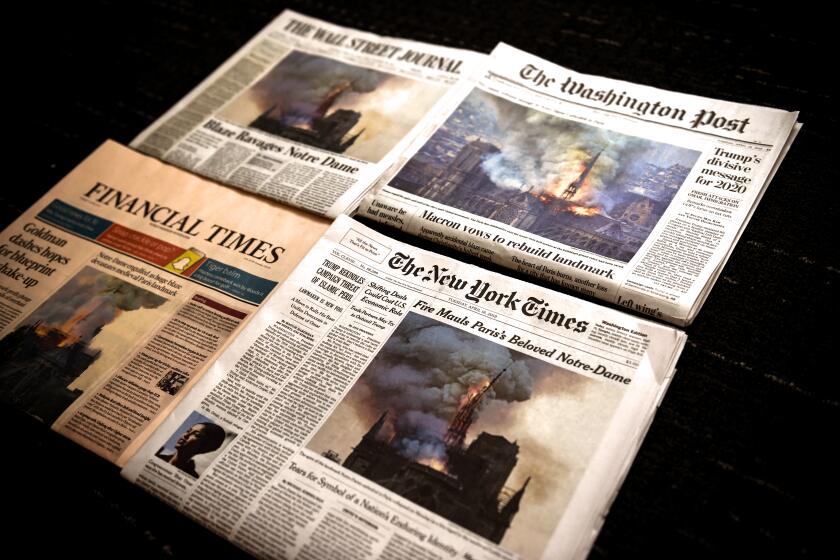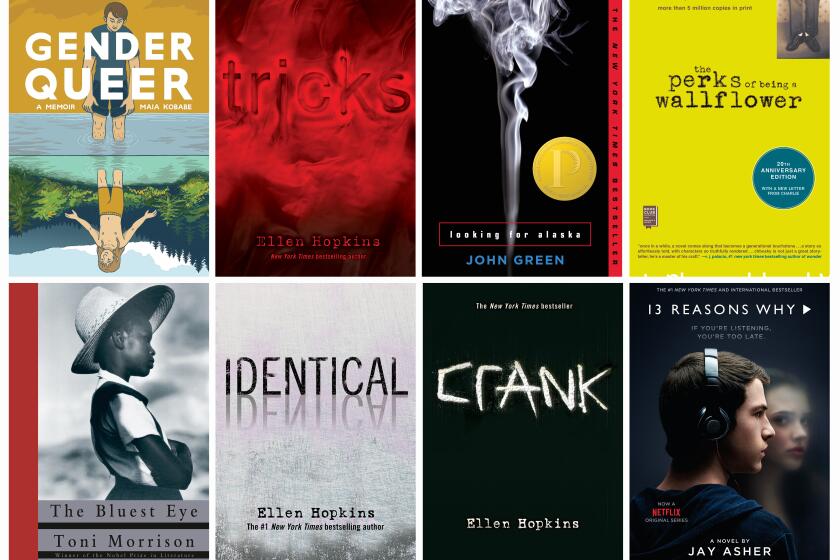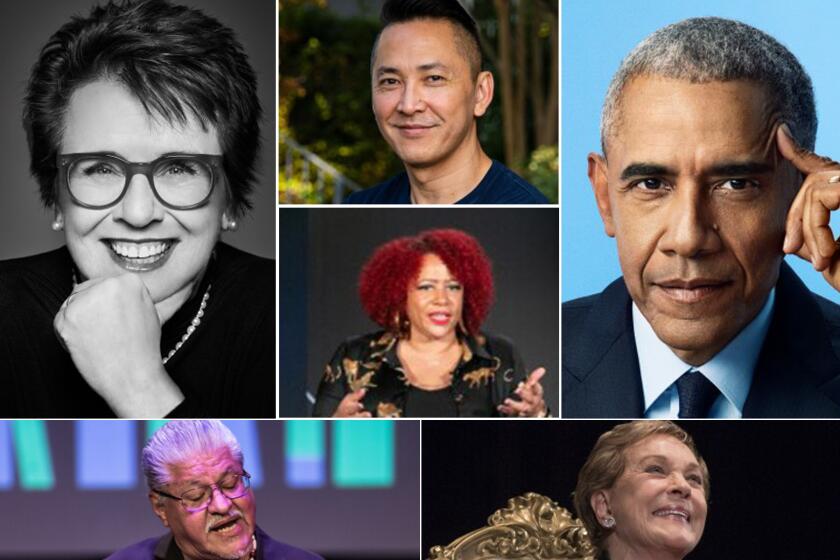How the nation’s most famous newspaper editor took on Trump and his own reporters
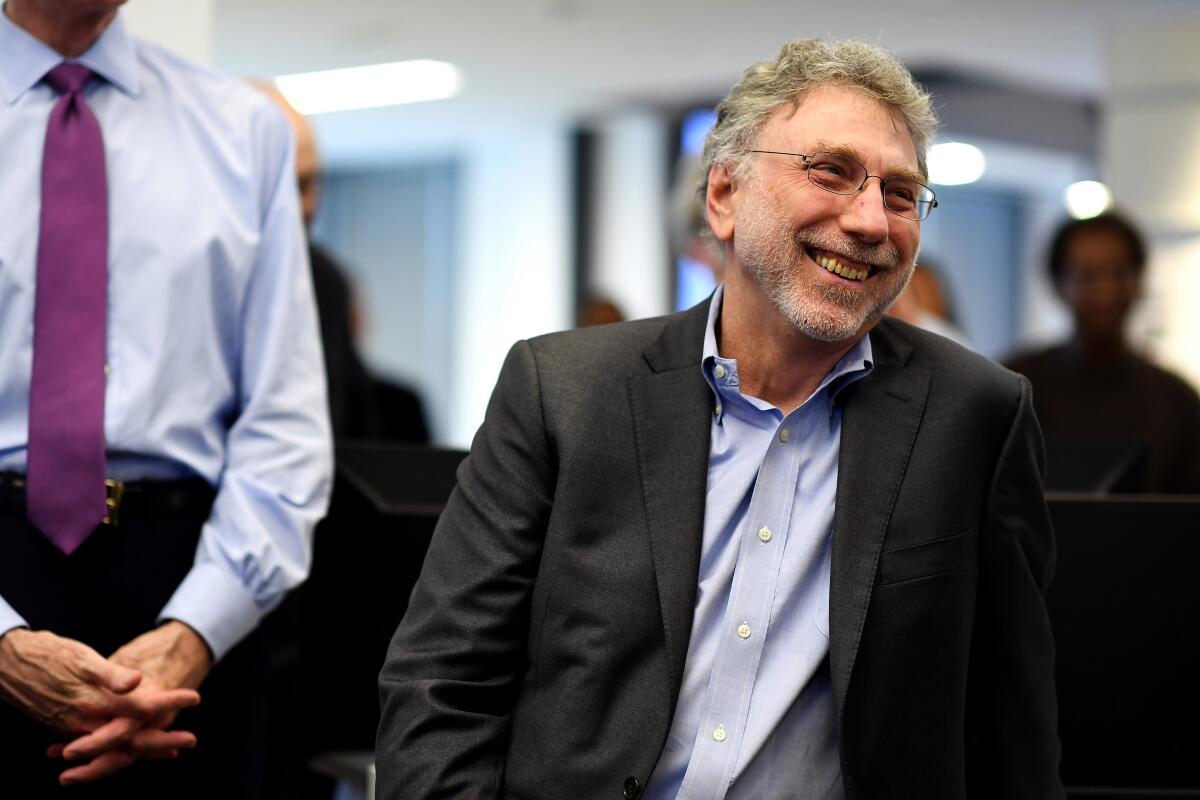
Former Washington Post editor Martin Baron joins the L.A. Times Book Club Oct. 11 to discuss “Collision of Power,” his book about Trump, Bezos and the future of journalism.
- Share via
Our memoir-laden era is heavy with tales of how luminaries became who they are.
No member of the Me Generation, the top editor of the Washington Post during the Donald Trump era figured he had plenty to write about without returning to his Tampa, Fla., childhood or his formative journalistic years on the Left Coast.
In “Collision of Power: Trump, Bezos, and the Washington Post,” Martin Baron eschews personal ruminations to show readers his years at the top of the journalistic pyramid. We see Baron laboring alongside one of the world’s wealthiest men to revive a storied news organization, locked in a struggle with the media-loathing occupant of the White House and fighting a rear-guard action against some of his employees over what it means to be a journalist.
After running the Miami Herald and the Boston Globe, Baron became the newspaper world’s most famous editor when the 2015 film “Spotlight” showcased how he pushed the Globe staff to expose a molestation scandal in the Catholic Church. Liev Schreiber nailed Baron’s quiet intensity in the film, and the actor narrates the “Collision of Power” audiobook — though Schreiber reads in his own voice, not the Baron monotone he made famous in the Academy Award-winning movie.
“I didn’t want to write a memoir. I don’t think that my life is all that interesting,” Baron said, in a phone interview from his home in the Berkshire Mountains of western Massachusetts. “The exception is what I have done in public life. That’s what I felt was important. That’s what I think is consequential. I think people are entitled to know why I made the decisions I did as the executive editor.”
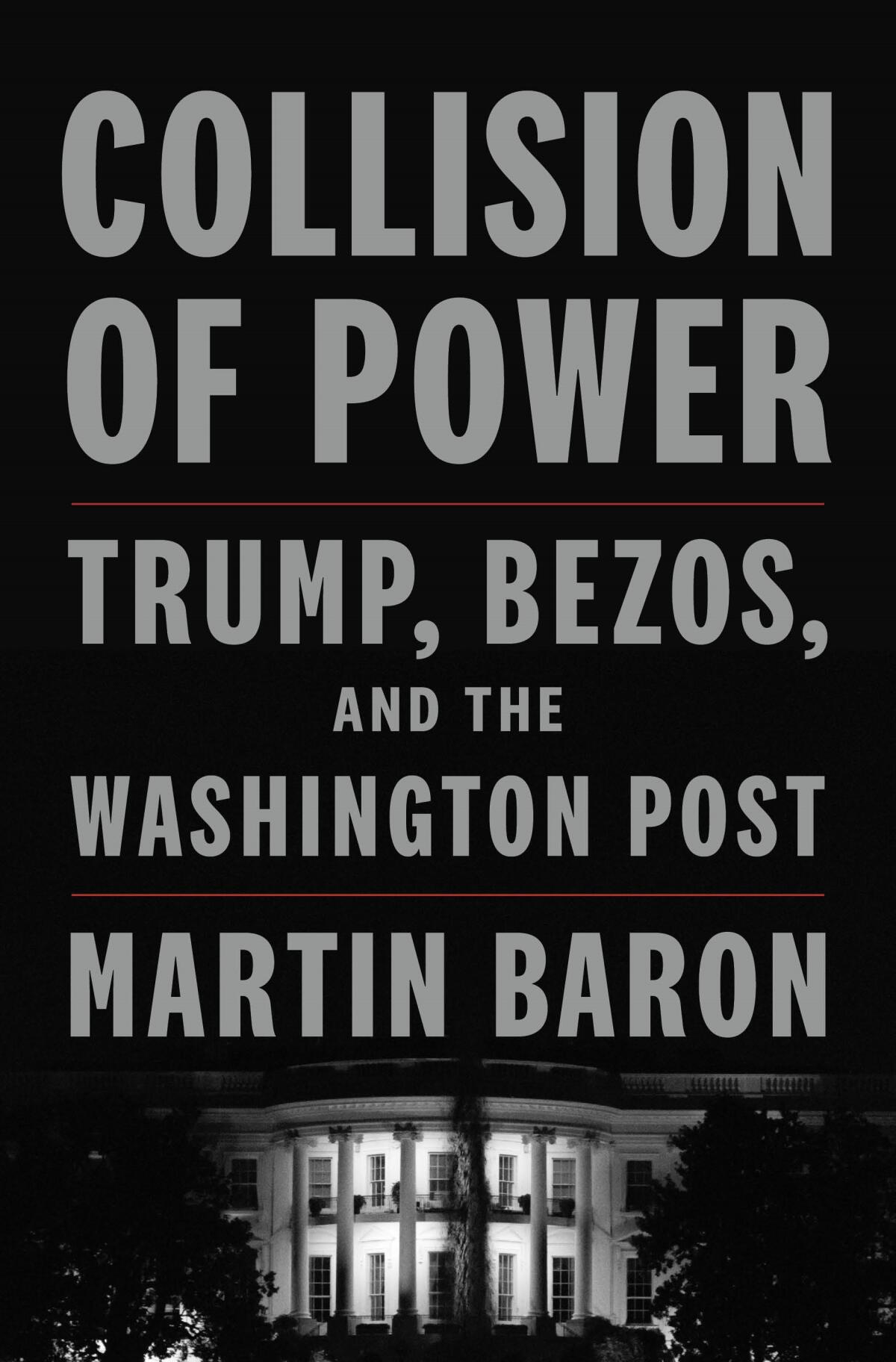
Baron joins the L.A. Times Book Club Oct. 11 to discuss “Collision of Power,” which includes revelations about Trump’s unscheduled telephone rants, Post owner Jeff Bezos’ occasionally quirky ideas and the failure of Post journalists to inform Baron about one of the biggest stories going — revelations alleging Russia had meddled in the 2016 election. The editor tells of a previously secret (and awkward) White House dinner that brought together Bezos, the Post’s top leaders and Trump and some of his family.
Baron also provides his first detailed comments on internal Post furor — over coverage of sexual misconduct during the #MeToo Era and racial bias following the 2020 murder of George Floyd.
In a rare personal disclosure, Baron writes about his long-running struggle with a genetic disorder that triggers uncontrollable bleeding. Hereditary hemorrhagic telangiectasia (HHT) killed Baron’s father at 74. The editor, who retired from the Post in early 2021, will turn 69 in October.
The man whom co-workers know as “Marty” said he is enjoying a break from the rigors of a career that allowed little time away from the keyboard. He now lives in a Craftsman home on a dirt road, bordering a state forest, where he has time for hiking, kayaking and sharing a lively local arts scene with other Boston and New York expatriates. “If I get tired of communing with the porcupines, bears and foxes, I go to New York to talk to people,” he quipped. He keeps a small apartment on the Upper West Side of Manhattan.
Baron’s friend and onetime colleague, former New York Times Executive Editor Dean Baquet, appears in the book and sang its praises. “It’s important for Americans to understand how much newspapers and news organizations are in peril,” Baquet said, “and to read the thoughts of a guy struggling with the place of journalism, going forward. Plus, it’s just a good read.”
The following is a synopsis of my 90-minute chat with Baron, who worked from 1979 to 1996 at the Los Angeles Times as a reporter, business editor and editor of the then-daily Orange County edition. Later, he became an occasional subject of my reporting when I wrote about the media for The Times.
Our conversation touched on his career, the future of journalism and whether Stephen Colbert had a better suggestion for the Post’s mission statement than “Democracy Dies in Darkness.”
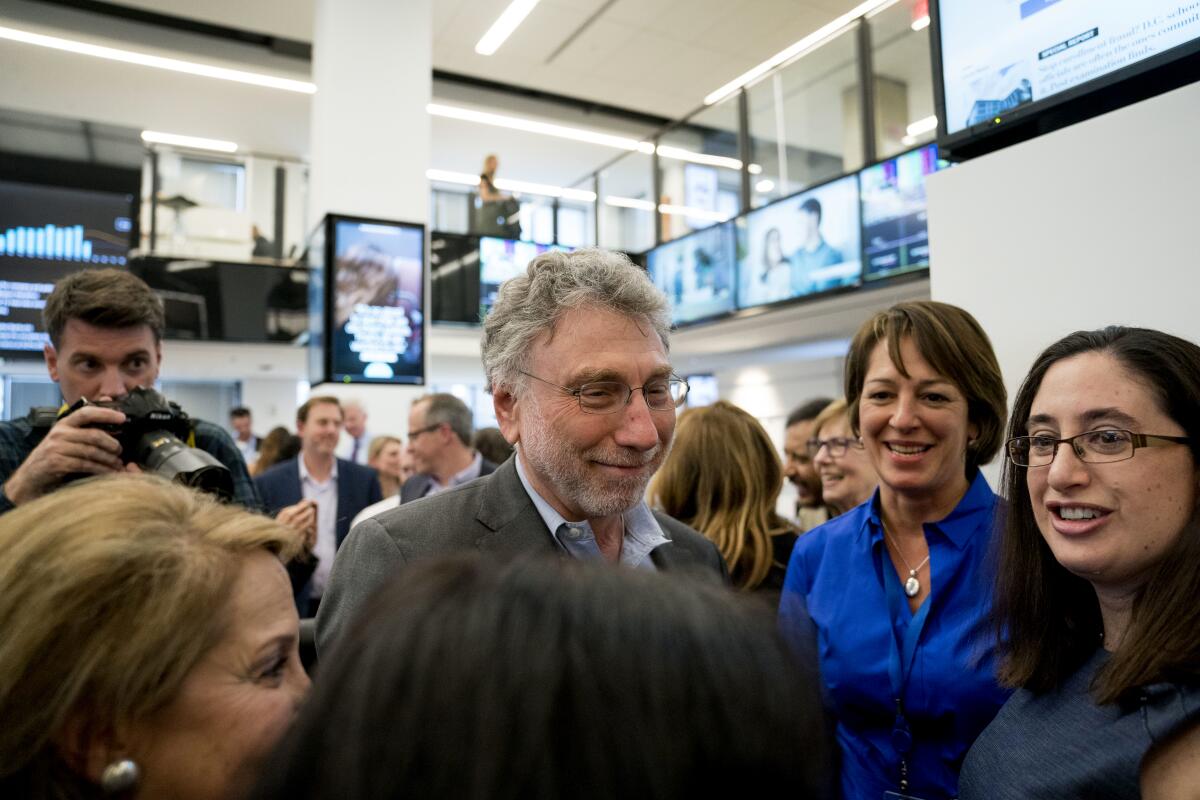
Do you expect Donald Trump to read your book? And what would you hope he would get out of it?
I don’t think he read his own books. … He had other people write them and it became evident, over time, he may not have read his own books. So I don’t expect him to read this book. … What I hope other people take away from it is how one news organization actually works, how we really operate, as opposed to the conspiracy theories. There are really difficult decisions that have to be made. And a lot of care goes into those decisions.
Our job is to hold power to account. It’s always been that way. What James Madison had in mind when he was the principal drafter of the 1st was a press that would be freely examining ... politicians and government officials and people with power.
You reveal that shortly after you, Bezos and Post executives met with Trump in 2017, he began to call you at unscheduled times to vent about the paper’s coverage. You took notes. Was any of it newsworthy?
No. It wasn’t a revelation [for instance] that he blamed Bezos for what we were doing or that he considered the paper a “big fat lie.” He said all that publicly. … What struck me was that he had the time to personally tell me all that. You would think that the president of the United States would have better things to do with his time.
Martin Baron’s ‘Collision of Power’ and Adam Nagourney’s ‘The Times’ chart the power and money struggles of the Washington Post and New York Times.
There were many tough stories on Trump, including his exaggerations about his charitable giving and reporting about Russia and the 2016 election. Nobody filled you in on the reporting about the so-called Steele Dossier, or the staff infighting over how to cover that series of documents. What happened?
Everybody thought somebody else had told me, that someone up the line did it. ... I wouldn’t say that I was angry. But I was pretty annoyed. By then there were a lot of conflicts on the staff over the whole story. We clearly needed to coordinate better. … We had meetings and everyone attended, even the people who didn’t necessarily get along with each other.
The paper later won the Pulitzer Prize for national reporting on “Russian interference in the 2016 presidential election and its connections to the Trump campaign, the president-elect’s transition team and his eventual administration.” Unlike BuzzFeed, the Post and other big news outlets decided not to publish the full text of the Steele Dossier, which later proved to include unproven allegations. Why not just give readers the document and let them make their own judgments?
Most news organizations, including BuzzFeed, for months held on to the same idea, that it’s important to try to verify what was in [the dossier.] It was only when CNN reported that [the dossier] had been handed to Trump that BuzzFeed made the decision to publish the entire report. … This wasn’t a decision of “The American public needs to know this.” This was a decision that, “Well, we need to make sure that we’re ahead of the competition. There is potential [internet] traffic here for us.” ... I think that there were motives that weren’t so high-minded at all. … At the core of what journalism and journalists should do is verify.
A major topic in your book is how many journalists, especially younger ones, believe they should not have to abide by traditional rules limiting how they express themselves on political matters. Why should journalists be careful about exercising free speech rights?
The reason we hire people is to go and report and to hear what other people are saying, to look at evidence, to look at documents. An important part of our work is that we’re getting outside of ourselves, not being absorbed with ourselves. I don’t think that we should be communicating that we are absorbed with ourselves. And opinions, by the way, they come cheap. Everybody has one. Reporting does not come cheap. Anything that undermines the public trust in our reporting — the primary source of our value — is, I think, a mistake.
You report that Bezos didn’t get involved in story decisions. But he did pick what he called the “mission statement” of the Post: “Democracy Dies in Darkness.” What was your choice?
I was leaning toward “The story must be told.”
I thought Stephen Colbert had a pretty good one. He said a finalist was, “We took down Nixon. Who wants next?”
[Laughing heartily] That would have been pretty good.
You write that, following the death of George Floyd, you failed to do enough to acknowledge the deep pain felt by the Post’s Black journalists. You also said it was your “most serious error” to not push for a high-ranking editor to help hire a more diverse staff and to strengthen coverage of “race, ethnicity and identity.” Even as a high school journalist you pushed for racial integration. Why do you believe you fell short on the subject?
I was just so singlemindedly focused on, how do we get this place turned around? How do we get more traffic? How do we become more competitive journalistically? We needed to do a lot to recover. So adding positions in the senior ranks was just not high on the priority list. [Bezos also made clear he wanted to hire many more “content creators” than managers.]
I always encouraged people to be good listeners and I don’t think I was one, in that instance. I should have been an advocate for adding leadership positions that would have provided more diversity and also led to broader coverage.
I have to ask about a moment earlier in your career. You write about how the U.S. Supreme Court stopped the recount of votes in Florida in 2000, with George W. Bush leading Al Gore by 537 votes. Your Miami Herald reporters joined with an independent accounting firm to do an exhaustive review of ballots in all 67 Florida counties. Their report concluded that Bush “most likely” would have won, even with a full recount. What did that story show?
We owe it to readers to go after the facts. They deserve to know. We have to do that regardless of the pressures. But we also do it regardless of the outcome, regardless of who might gain or who might lose.
Books, literacy and freedom of expression are under assault as never before. A new report shows that book bans at U.S. schools increased 33% since just last year.
You accomplished a lot, exemplified by the 10 Pulitzer Prizes the Post won under your leadership. So will you miss it?
I was an editor at three different news organizations over the course of 20 years. It became ever more exhausting, because it’s not just a 24-7 job, it’s a 24-7-every-minute job. And I [increasingly] felt a chasm between how I felt journalism should be practiced and how at least a good number of people on our staff wanted to practice it. I didn’t know that I could really resolve that. … Now, I don’t have to deal with that every single day. I want to move on and do other things. … So, no, I don’t miss it.
Do you have another book in you?
I have an idea or two. I don’t know yet. I want to get through this one and maybe recover a little bit. I was just sitting at home in the middle of the woods, writing a book. It was beautiful outside. And I wanted to go outside.
For the first time in my life, I don’t know what I’m going to do next. And I’m fine with that. I will figure it out, I’m sure.
Book Club: Martin Baron
What: Former Washington Post Editor Martin Baron joins the L.A. Times Book Club to discuss “Collision of Power” with Times Executive Editor Kevin Merida.
When: Oct. 11 at 6 p.m. Pacific
Where: USC Annenberg School for Communication and Journalism, 3630 Watt Way, Los Angeles. Get tickets on Eventbrite for this live, in-person conversation, also available virtually.
Join: Sign up for the free book club newsletter for the latest book, news and live journalism events.
Do you enjoy our book conversations? Here’s how to support the Los Angeles Times Community Fund and the newspaper’s literary and literacy programs.
More to Read
Sign up for our Book Club newsletter
Get the latest news, events and more from the Los Angeles Times Book Club, and help us get L.A. reading and talking.
You may occasionally receive promotional content from the Los Angeles Times.

